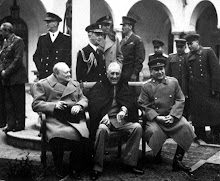Dismantling the eurozone may bring upon the world its third world war. WWI and WWII both started in Europe, so why should WWIII be any different?
According to the Maastricht Treaty, European Union member states must adopt the euro (with the exception of Britain and Denmark, which have negotiated an opt-out) as their currency at some point, if they fulfil the convergence criteria.
No timeframe is given for the adoption of the euro and this is how Sweden, without explicitly opting out of the monetary union, has deliberately avoided joining by failing to meet the convergence criteria.
The eurozone currently has 16 members (17 with Estonia joining on January 1, 2011) but, since the Greek crisis erupted in full early in 2010, chatter about countries leaving or the monetary union breaking up altogether has grown louder and louder.
But if the eurozone were to break up, the consequences may eventually lead to war because of the sheer depth of the resulting political, economic and social crisis and the lack of hope that would follow.
The EU treaties do not allow a member of the eurozone to leave the monetary union while staying in the European Union. It’s either the EU and the euro, or nothing.
Leaving the eurozone would mean leaving the EU – and all the advantages that it confers, such as selling goods in the rest of the 27 member states without having to face import duties, selling services freely to them, being able to access capital from these countries, freedom of movement of citizens within the area.
Fragmented Backwater
It may not seem like much, but it has brought on incredible economic progress, especially for the less advanced members, and it has been achieved after decades of patient diplomatic negotiations. It has also put a lid on various inter-ethnic conflicts in what is probably the world’s most divided continent.
Membership of the euro was regarded by some members as the ultimate proof that they have “made it” in a select group of economically-sound countries, with clear rules and advantages and part of a strong currency, without the often-painful fluctuations brought on by massive devaluations.
The euro also acted as a catalyst for lesser developed members of the EU, providing them with something to aspire to, an incentive for reform and economic progress.
The EU, as a whole, guarantees its citizens freedom of movement, freedom of speech, access to a clear justice system and the right to have their voice heard. Yes, I know that it doesn’t look like much has been achieved by the EU, but this is because citizens too often take these rights for granted and don’t even realise they are exercising them every day.
If the EU were to disintegrate, Europe would go back to being the fragmented, war-mongering little backwater it used to be. There would be no super-power on the continent, just a few big and strong countries trampling over the little ones in their fight for domination.
Let’s imagine this scenario: everybody goes back to their original currencies. What happens is that the German mark and the French franc appreciate strongly, while the Greek drachma and Spanish peseta plummet. What can countries do to counteract the negative effects?
What Could Lead to War
Without the legislative framework of the EU, which specifically prohibits it, protectionism would flourish. Germany and France may limit inward investment in their currencies to keep them from strengthening, while Greece and Spain may do the opposite and put limits on outward flows of capital.
Next, Germany and France may limit inward migration, to protect their rich economies from hordes of poorer Europeans looking for work, while massive unemployment in Greece and Spain may cause street riots the scale of which has not been seen in a long time.
Things would not be rosy for Germany and France either because, without the common market, they would find it harder and harder to sell their products and services abroad as import taxes in the poorer former member states and various regulatory restrictions on imported goods and services would take effect in an attempt to protect local economies.
Resource-rich countries – such as Russia – may see this as an opportunity to negotiate “preferential” tariffs for their energy exports with each country in the former union; thus, different energy prices would distort competition even further.
All this would throw the former EU back decades in time as it would stifle innovation, bring development to a screeching halt and increase social unrest to the point of boiling over.
It doesn’t take a lot of imagination to get from that to nationalist/extremist parties rising to power in many former EU states on hollow promises of better living and on blaming “others” for the country’s misfortune, and eventually sparking the third world war.
I know many people will accuse me of scaremongering. But if you think back to the history of this continent, the EU is the only form of union that has brought incredible peace and prosperity to millions of people, without making others suffer in the process. I believe that such a union must absolutely be defended.
